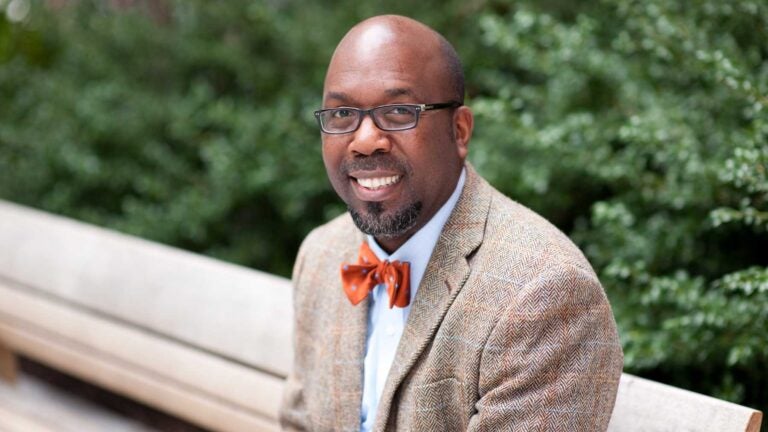
Reginald Tucker-Seeley studies how income and education affects and an person’s physical and mental health, with a focus on cancer patients. (Photo/Suzanne Camarata, Harvard University)
Studying the social factors that influence health outcomes
Reginald Tucker-Seeley looks beyond simple income measures to find out how a person’s finance-related feelings and behaviors affect disparities in physical and mental health
“Money can’t buy happiness,” according to the popular proverb states, but the way people feel about their financial situation and how they behave regarding their money can have profound effects on health and well-being, says new USC Leonard Davis School of Gerontology Assistant Professor Reginald Tucker-Seeley.
His current research focuses on financial well-being across the cancer continuum, from prevention to end-of-life care. In this work, he goes beyond capturing socioeconomic circumstances using traditional measures of socioeconomic status, such as income and education, and attempts to discern how an individual’s financial situation affects their physical and mental health and behaviors.
“Financial well-being describes how socioeconomic status is actually lived,” said Tucker-Seeley, who most recently was an assistant professor of social and behavioral sciences at Harvard University before arriving at USC in May. “For instance, you and I could report the same income on a survey, but we may live that income very differently. Measures of financial well-being attempt to drill down into that lived experience.”
Financial well-being
Tucker-Seeley described the three main domains in his model for measuring financial well-being: material, or the resources one has; psychosocial, or how one feels about those resources; and behavioral, or how an individual uses those resources. The multifaceted concept has already shown its potential to provide deeper insights for intervention and policy development, he added.
Measures of financial well-being help us better clarify socioeconomic intervention targets.
Reginald Tucker-Seeley
“Even after we control for traditional measures of socioeconomic status like income and education in our statistical models, we still see a significant association over and above the traditional measures of socioeconomic status. That’s telling us that indicators of financial well-being are robust correlates of health,” he said. “Measures of financial well-being help us better clarify socioeconomic intervention targets. We can be more precise about the area we’re defining, measuring and intervening.”
Another possible advantage: Study participants may be more likely to answer financial well-being questions than traditional income questions, Tucker-Seeley added.
“People may not tell you how much they make, but surprisingly we have found that they will tell you if they’re having problems paying their bills, if they are worried about their financial situation or if they are satisfied with their current financial resources,” he said.
Finding his academic calling
After receiving his bachelor’s degree in accounting from the University of Tulsa in Oklahoma, Tucker-Seeley’s career began in the finance department of a managed health care company in St. Louis and then as an internal auditor at Saint Louis University. However, an undergraduate study-abroad experience at London’s Richmond College sparked an interest in the social sciences that stuck with him, and he began pursuing a master’s degree in counseling and family therapy part-time while working at Saint Louis University.
Eventually, he returned to being a full-time student, but during his clinical internship at the Washington University Student Health and Counseling Service, he realized that being a practicing therapist also wasn’t his calling. Luckily, around that time he happened to read an article on the bio-psycho-social approach to health written by a professor in the Department of Social and Behavioral Sciences at Harvard’s T.H. Chan School of Public Health. The article helped Tucker-Seeley realize that he wanted to conduct research on the social factors that influence health outcomes.
“I was conducting research for my thesis and really loved the research process; I actually minored in research methodology while at Saint Louis University,” he said. “Additional reading on the bio-psycho-social approach to health provided the language for what I was interested in and introduced me to the phrase ‘social determinants of health.’ I remember reading those papers thinking, ‘I have to study the social determinants of health.’”
He did just that. Pursuing what has turned out to be his true calling, Tucker-Seeley completed both a master’s degree and doctorate at the Harvard School of Public Health. After that, he completed a postdoctoral fellowship in cancer prevention and control at the Dana-Farber Cancer Institute and Harvard School of Public Health. He later received a joint appointment at both institutions as assistant professor of social and behavioral sciences.
“If you look back at my journey, it may look a bit planned — the fact that I’m interested in financial issues and well-being and psychosocial issues, and I have a background in accounting and mental health — but at the time, it was not a planned journey,” Tucker-Seeley said.
Real-world impacts via policy work and teaching
In addition to continuing his work on financial well-being at USC, Tucker-Seeley will also have the opportunity to apply his knowledge in the federal policymaking environment as one of the 2017-18 Robert Wood Johnson Foundation Health Policy Fellows. Beginning in September, he will spend four months taking part in a health policy “boot camp” to learn about the federal health policymaking process and then spend another eight months working with a congressional or executive office and providing expertise on health policy issues. He will then return to USC for the second year of the fellowship to complete a related research project.
“Learning how federal health policy gets made was an incredibly attractive part of this fellowship,” Tucker-Seeley said. “Since I’m interested in how health policy affects different racial/ethnic and socioeconomic groups, I’m especially looking forward to seeing how policies addressing health disparities are created.”
Tucker-Seeley is also looking forward to teaching at USC Davis. Inspired by his service on the Commission for Health Advocacy and Equity in Rhode Island, he created a course called “Measuring and Reporting Health Disparities” at the Harvard School of Public Health. The now 3-year-old case-based learning course takes students through the process of developing health disparities reports for a state or large city.
While working with the commission, he learned about state health policy and the necessary intersectoral collaborations necessary to address health disparities, he said.
“Learning to translate research on the social determinants of health for policy efforts to reduce disparities are critical skills for our students, so I developed the course to give students an opportunity to learn and practice those skills. I love teaching it and I’m excited to bring the course to USC and engage with students on health disparities across the life course.”



